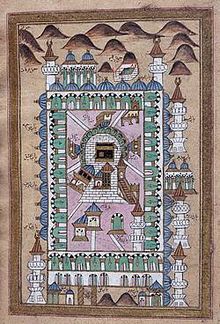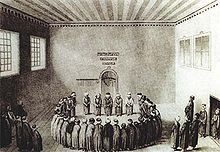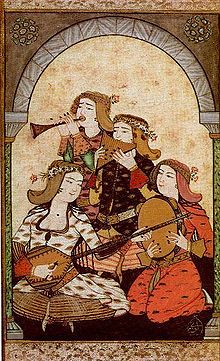- Eid al-Adha
-
عيد الأضحى
Id ul-Adha (‘Īd al-’Aḍḥá)
(Festivity after the Hajj)Official name Arabic: عيد الأضحى
‘Īd al-’AḍḥáAlso called Festival of Sacrifice,
Sacrifice FeastObserved by Muslims around the world. Type Islamic Significance Commemoration of Ibrahim's (Abraham's) willingness to sacrifice his eldest son Ishmael in obedience to a command from Allah - and Ishmael's acceptance of this command.
Marks the end of the Pilgrimage to sundown, and ask God for forgiveness.Begins 10 Dhu al-Hijjah Ends 13 Dhu al-Hijjah 2011 date November 6 to November 9 Celebrations Family meals (especially lunches and late breakfasts), eating sweet foods, wearing new clothes, giving gifts or money to children Observances Prayer, sacrificing a cow, lamb, goat, sheep, or a camel, giving to poor people as a gift. Related to Hajj, Eid ul-Fitr 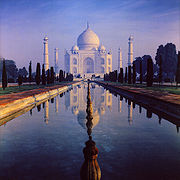
Part of a series on
Islamic culture
Architecture Arabic · Azeri
Indo-Islamic · Iwan
Moorish · Moroccan · Mughal
Ottoman · Persian · Somali
Sudano-Sahelian · TatarArt Calligraphy · Miniature · Rugs
Dress Abaya · Agal · Boubou
Burqa · Chador · Jellabiya
Niqab · Salwar kameez · Taqiya
kufiya · Thawb · Jilbāb · HijabHolidays Ashura · Arba'een · al-Ghadeer
Chaand Raat · al-Fitr · al-Adha
Imamat Day · al-Kadhim
New Year · Isra and Mi'raj
al-Qadr · Mawlid · Ramadan
Mugam · Mid-Sha'ban
al-TaiyyabLiterature Arabic · Azeri · Bengali
Indonesian · Javanese · Kashmiri
Kurdish · Persian · Punjabi · Sindhi
Somali · South Asian · Turkish · UrduEid al-Adha (Arabic: عيد الأضحى ‘Īd al-’Aḍḥá, IPA: [ʕiːd al ʔadˁˈħaː], "feast of sacrifice") or "Festival of Sacrifice" or "Greater Eid" is an important religious holiday celebrated by Muslims worldwide to commemorate the willingness of Abraham (Ibrahim) to sacrifice his son Ishmael (Isma'il) as an act of obedience to God, before God intervened to provide him with a sheep— to sacrifice instead.[1]
Eid al-Adha is the latter of two Eid festivals celebrated by Muslims, whose basis comes from Sura 2 (Al-Baqara) Ayah 196 in the Qur'an.[2] Like Eid ul-Fitr, Eid al-Adha begins with a Sunnah prayer of two Raka'ah (units) followed by a sermon (khuṭbah).
The word "Eid" appears in Sura al-Mai'da ("The Table Spread," Chapter 5) of the Qur'an, meaning 'solemn festival'.[3]
Eid al-Adha is celebrated annually on the 10th day of the 12th and the last Islamic month of Dhu al-Hijjah (ذو الحجة) of the lunar Islamic calendar.[4] Eid al-Adha celebrations start after the Hajj, the annual pilgrimage to Mecca in Saudi Arabia by Muslims worldwide, descend from Mount Arafat. The date is approximately 70 days (2 Months & 10 days) after the end of the month of Ramadan, i.e. Eid-ul-Fitr. Ritual observance of the holiday lasts until sunset of the 13th day of Dhu al-Hijjah.[5]
Contents
Other names
The Arabic term "Festival of Sacrifice", ‘Eid ul-’Aḍḥā, is similar to the Semitic roots that evolved into Indic languages such as Hindi, Urdu, Gujarati and Bengali and Austronesian languages such as Malay and Indonesian (the last often spelling it as Idul Adha or Iduladha).
Another Semitic word for "sacrifice" is the Arabic Qurbān (Arabic: قربان), which is used in Dari Persian and Standard Persian as Eyde Ghorbân عید قربان, and in Tajik Persian as Иди Қурбон (Idi Qurbon), into Kazakh as Құрбан айт (Qurban ayt), into Uyghur as Qurban Heyit, and also into various Indic languages. Other languages combined the Arabic word qurbān with local terms for "festival", as in Kurdish (Cejna Qurbanê[6]), Pashto (Kurbaneyy Akhtar), Chinese (古尔邦节 Gúěrbāng Jié), Malay and Indonesian (Hari Raya Korban, Qurbani), and Turkish (Kurban Bayramı).Azeri (Qurban Bayramı), Tatar (Qorban Bäyräme), Bosnian (Kurban bajram), Albanian(Bajramin e Kurbanit) Croatian (Kurban-bajram), Serbian (Курбан бајрам), Russian (Курбан-байрам), (Eid Kurbani Wari) in Sindhi.
Eid al-Kabir, "the Greater Eid" (the "Lesser Eid" being Eid ul-Fitr[7]), is used in Yemen, Syria, and North Africa (Morocco, Algeria, Tunisia, Libya, and Egypt). The term was borrowed directly into French as Aïd el-Kebir. Translations of "Big Eid" or "Greater Eid" are used in Pashto لوی اختر Loy Akhtar, Kashmiri Baed Eid, Hindi and Urdu Baṛā Īd, Malayalam Bali Perunnal, and Tamil Peru Nāl.
Another name refers to the fact that the holiday occurs after the culmination of the Hajj (حج), or pilgrimage to Mecca (Makka). Such names are used in Malay and Indonesian (Hari Raya Haji "Hajj celebration day", Lebaran Haji), and in Tamil Hajji Peru Nāl.
In Urdu-speaking areas, the festival is also called بقرعید Baqra Īd or Baqrī Īd, stemming either from the Arabic baqarah "heifer" or the Urdu word baqrī for "goat", as cows and goats are among the traditionally sacrificed animals. That term was also borrowed into other languages, such as Tamil Bakr Eid Peru Nāl.
Other local names include 宰牲节 Zǎishēng Jié ("Slaughter-livestock Festival") in Chinese, Tfaska Tamoqqart in the Berber language of Djerba, Tabaski or Tobaski in West African languages,[8][9] Babbar Sallah in Nigerian languages, and ciida gawraca in Somali.
Eid-al-Adha has had other names outside the Muslim world. The name is often simply translated into the local language, such as English Festival of Sacrifice, German Opferfest, Dutch Offerfeest, Romanian Sărbătoarea Sacrificiului and Hungarian Áldozati ünnep. In Spanish, it is known as the Fiesta del Cordero, the Festival of the Lamb.
In Bangladesh and West Bengal it is known as Korbanir Eid কোরবানির ঈদ.
Origin
According to Islamic tradition, approximately four thousand years ago, the valley of Mecca (in what is now Saudi Arabia) was a dry, rocky and uninhabited place. Abraham ('Ibraheem in Arabic) was instructed to bring his Egyptian wife Hajra (Hāǧar) and Ishmael, his only child at the time (Ismā'īl), to Arabia from the land of Canaan by God's command.[citation needed]
As Abraham was preparing for his return journey back to Canaan, Hajar asked him, "Did Allah (God) order you to leave us here? or are you leaving us here to die." Abraham turned around to face his wife. He was so sad that he couldn't say anything. He pointed to the sky showing that God commanded him to do so. Hajar said, "Then Allah will not waste us; you can go". Though Abraham had left a large quantity of food and water with Hajar and Ishmael, the supplies quickly ran out, and within a few days the two began to feel the pangs of hunger and dehydration.
Hajar ran up and down between two hills called Al-Safa and Al-Marwah seven times, in her desperate quest for water. Exhausted, she finally collapsed beside her baby Ishmael and prayed to God for deliverance. Miraculously, a spring of water gushed forth from the earth at the feet of baby Ishmael. Other accounts have the angel Gabriel (Jibrail) striking the earth and causing the spring to flow in abundance. With this secure water supply, known as the Zamzam Well, they were not only able to provide for their own needs, but were also able to trade water with passing nomads for food and supplies.
Years later, Abraham was instructed by God to return from Canaan to build a place of worship adjacent to Hagar's well (the Zamzam Well). Abraham and Ishmael constructed a stone and mortar structure —known as the Kaaba— which was to be the gathering place for all who wished to strengthen their faith in God. As the years passed, Ishmael was blessed with Prophethood (Nubuwwah) and gave the nomads of the desert his message of submission to God. After many centuries, Mecca became a thriving desert city and a major center for trade, thanks to its reliable water source, the well of Zamzam.
One of the main trials of Abraham's life was to face the command of God to devote his dearest possession, his only son. Upon hearing this command, he prepared to submit to God's will. During this preparation, Satan (Shaitan) tempted Abraham and his family by trying to dissuade them from carrying out God's commandment, and Ibrahim drove Satan away by throwing pebbles at him. In commemoration of their rejection of Satan, stones are thrown at symbolic pillars signifying Satan during the Hajj rites.
When Ishmael was about 13 (Ibrahim being 99), Allah (God) decided to test their faith in public. Abraham had a recurring dream, in which God was commanding him to offer his son as a sacrifice – an unimaginable act – sacrificing his son, which God had granted him after many years of deep prayer. Abraham knew that the dreams of the prophets were divinely inspired, and one of the ways in which God communicated with his prophets. When the intent of the dreams became clear to him, Abraham decided to fulfill God's command and offer Ishmael for sacrifice.
Although Abraham was ready to sacrifice his dearest for Allah's sake, he could not just go and drag his son to the place of sacrifice without his consent. Isma'el had to be consulted as to whether he was willing to give up his life as fulfillment to God's command. This consultation would be a major test of Isma'el's maturity in faith, love and commitment for Allah, willingness to obey his father and sacrifice his own life for the sake of Allah.
Abraham presented the matter to his son and asked for his opinion about the dreams of slaughtering him. Ishmael did not show any hesitation or reservation even for a moment. He said, "Father, do what you have been commanded. You will find me, Insha'Allah (God willing), to be very patient." His mature response, his deep insight into the nature of his father’s dreams, his commitment to Allah, and ultimately his willingness to sacrifice his own life for the sake of Allah were all unprecedented.
When both father and son had shown their perfect obedience to Allah and they had practically demonstrated their willingness to sacrifice their most precious possessions for His sake — Abraham by laying down his son for sacrifice and Ishmael by lying patiently under the knife – Allah called out to them stating that his sincere intentions had been accepted, and that he need not carry out the killing of Ishmael. Instead, Abraham was told to replace his son with a goat to sacrifice instead. Allah also told them that they had passed the test imposed upon them by his willingness to carry out God's command.[10]
This is mentioned in the Qur'an as follows:
"O my Lord! Grant me a righteous (son)!" So We gave him the good news of a boy, possessing forbearance. And when (his son) was old enough to walk and work with him, (Abraham) said: O my dear son, I see in vision that I offer you in sacrifice: Now see what is your view!" (The son) said: "O my father! Do what you are commanded; if Allah wills, you will find me one practising patience and steadfastness!" So when they both submitted and he threw him down upon his forehead, We called out to him saying: O Ibraheem! You have indeed fulfilled the vision; surely thus do We reward those who do good. Most surely this was a manifest trial. And We ransomed him with a momentous sacrifice. And We perpetuated (praise) to him among the later generations. "Peace and salutation to Abraham!" Thus indeed do We reward those who do right. Surely he was one of Our believing servants.[11]
As a reward for this sacrifice, Allah then granted Abraham the good news of the birth of his second son, Is-haaq (Isaac):
And We gave him the good news of Is-haaq, a prophet from among the righteous.[12]
Abraham had shown that his love for God superseded all others: that he would lay down his own life or the lives of those dearest to him in submission to God's command. Muslims commemorate this ultimate act of sacrifice every year during Eid al-Adha.
The Sunnah of Eid al-Adha
In keeping with the tradition of the Prophet Muhammad, Muslims are encouraged to prepare themselves for the occasion of Eid. Below is a list of things Muslims are recommended to do in preparation for the Eid al-Adha festival:
- Make wudu (ablution) and offer Salat al-Fajr (the pre-sunrise prayer).
- Prepare for personal cleanliness - take care of details of clothing, etc.
- Dress up, putting on new or best clothes available.
Salat al-Eid (Eid prayer)
The scholars differed concerning the ruling on Eid prayers. There are three scholarly points of view:
1 – That Eid prayer is Sunnah mu’akkadah (recommended). This is the view of Imam Maalik and Imam al-Shaafa’i.
2 – That it is a Fard Kifaya (communal obligation). This is the view of Imam Ahmad.
3 – That it is Wajib on all Muslim men (a duty for each Muslim and is obligatory for men); those who do not do it with no excuse are sinning thereby. This is the view of Imam Abu Haneefah, and was also narrated from Imam Ahmad. Among those who favoured this view were Shaykh al-Islam Ibn Taymiyah and al-Shawkaani.
Eid prayer must be offered in congregation. It consists of two Raka'ah (units) with seven Takbirs in the first Raka'ah and five Takbirs in the second Raka'ah. For Sunni Muslims, Salat al-Eid differs from the five daily canonical prayers in that no adhan (Call to Prayer) or iqama (call) is pronounced for the two Eid prayers.[13] However, Shi'ite Muslims may begin Salat al-Eid with adhan (Call to Prayer)—with a third repetition of the line "Hayya ala salah" ("Come to prayer")—and iqama (call).[14] The Salaat (prayer) is then followed by the Khutbah, or sermon, by the Imam.
At the conclusion of the prayers and sermon, the Muslims embrace and exchange greetings with one other (Eid Mubarak), give gifts (Eidi) to children, and visit one another. Many Muslims also take this opportunity to invite their non-Muslims friends, neighbours, co-workers and classmates to their Eid festivities to better acquaint them about Islam and Muslim culture.[15]
The Takbir and other rituals
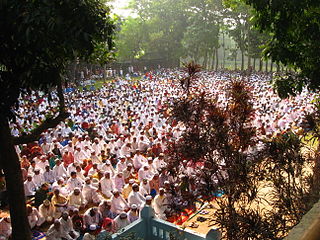 Prayers in Comilla, Bangladesh can be seen attending Khutbah as part of the Eid-ul-Adha prayers on 7 November, 2011.
Prayers in Comilla, Bangladesh can be seen attending Khutbah as part of the Eid-ul-Adha prayers on 7 November, 2011.
The Takbir is recited from the dawn of the tenth of Dhu al-Hijjah to the thirteenth, and consists of:[16]
-
Allāhu akbar, Allāhu akbar, Allāhu akbar الله أكبر الله أكبر الله أكبر lā ilāha illā Allāh لا إله إلا الله Allāhu akbar, Allāhu akbar الله أكبر الله أكبر wa li-illāhil-hamd ولله الحمد
- Allah is the Greatest, Allah is the Greatest, Allah is the Greatest,
- There is no deity but Allah
- Allah is the Greatest, Allah is the Greatest
- and to Allah goes all praise
Variation
-
Allāhu akbar, Allāhu akbar الله أكبر الله أكبر lā ilāha illā Allāh لا إله إلا الله wa Allāhu akbar, Allāhu akbar والله أكبر الله أكبر wa li-illāhil-ḥamd ولله الحمد Alḥamdulillāh `alā mā hadānā, wa lahul-shukru `ala mā awlānā الحمد لله على ما هدانا و له الشكر على ما اولانا
- Allah is the Greatest, Allah is the Greatest,
- There is no deity but Allah
- and Allah is the Greatest, Allah is the Greatest
- and to Allah goes all praise, (We) sing the praises of Allah because He has shown us the Right Path. (We) gratefully thank Him because He takes care of us and looks after our interests.
Variation:
-
Allāhu akbar, Allāhu akbar, Allāhu akbar الله أكبر الله أكبر الله أكبر lā ilāha illā Allāh لا إله إلا الله Allāhu akbar, Allāhu akbar الله أكبر الله أكبر wa li-illāhil-ḥamd ولله الحمد Allāhu akbar kabīra, wal ḥamdu lillāhi kathīra, wa subḥāna Allāhi bukratan wa aṣīlā الله أكبر كبيرا والحمد لله كثيرا وسبحان الله بكرة وأصيلا lā ilāha illā Allāh waḥdah(i) لا اله إلا الله وحده Ṣadaqa wa`dah, wa naṣara abdah, wa 'a`azza jundahu wa ḥazama al-aḥzaba waḥdah صدق وعده ونصر عبده وأعز جنده وهزم الأحزاب وحده lā ilāha illā Allāh لا إله إلا الله walā na`budu illā iyyāh ولا نعبد إلا إياه Mukhliṣīn lahu ud-dīn wa law kariha al kāfirūn مخلصين له الدين ولو كره الكافرون Allāhumma ṣallī `alā Sayyidinā Muḥammad, wa `alā āla Sayyidinā Muḥammad, wa `alā aṣḥabi Sayyidinā Muḥammad, wa `alā anṣāri Sayyidinā Muḥammad, wa `alā azwāji Sayyidinā Muḥammad, wa `alā ḏurriyyati Sayyidinā Muḥammadin wa sallim taslīman kathīra اللهم صل على سيدنا محمد وعلى آل سيدنا محمد وعلى أصحاب سيدنا محمد وعلى أنصار سيدنا محمد وعلى أزواج سيدنا محمد وعلى ذرية سيدنا محمد وسلم تسليما كثيرا
- Allah is the Greatest, Allah is the Greatest, Allah is the Greatest,
- There is no deity but Allah
- Allah is the Greatest, Allah is the Greatest
- and to Allah goes all praise
- Allah is the Greatest, all Praise is due to Him, And Glory to Allah, eventide and in the morning
- There is no god, but Allah the Unique
- He has fulfilled His Promise, and made Victorious His worshipper, and made Mighty His soldiers and defeated the confederates
- There is no deity but Allah
- He alone we worship
- With sincere and exclusive devotion, even though the infidels hate it
- O Allah, have Mercy on our Prophet Muhammad, and on the family of our Prophet Muhammad, and on the Companions of our Prophet Muhammad, and on the Helpers of our Prophet Muhammad, and on the wives of our Prophet Muhammad, and on the offspring of our Prophet Muhammad, and bestow upon them much peace.
Eid Prayer is Wajib, not a fard kafaya.
Traditions and practices
 A panorama in 12 folds showing Muslims returning from their Mosques after Eid prayers in the Mughal Empire.
A panorama in 12 folds showing Muslims returning from their Mosques after Eid prayers in the Mughal Empire.
Men, women, and children are expected to dress in their finest clothing to perform Eid prayer (ṣalātu l-`Īdi) in a large congregation is an open waqf field called Eidgah or mosque. Those Muslims who can afford, i.e Malik-e-Nisaab; sacrifice their best domestic animals (usually a cow, but can also be a camel, goat, sheep or ram depending on the region) as a symbol of Abraham's willingness to sacrifice his only son. The sacrificed animals, called Uḍhiyyah (Arabic: أضحية, also known by its Persian term, "al-Qurbāni"), have to meet certain age and quality standards or else the animal is considered an unacceptable sacrifice. This tradition accounts for more than 100 million slaughtering of animals in only 2 days of Eid. In Pakistan alone nearly 10 million animals are slaughtered on Eid days costing over US$ 3 billion.[17]
The meat from the sacrificed animal is divided into three parts. The family retains one third of the share; another third is given to relatives, friends and neighbors; and the other third is given to the poor and needy. The regular charitable practices of the Muslim community are demonstrated during Eid al-Adha by concerted efforts to see that no impoverished person is left without an opportunity to partake in the sacrificial meal during these days.
During Eid al-Adha, distributing meat amongst the people, chanting the Takbir out loud before the Eid prayer on the first day and after prayers throughout the three days of Eid, are considered essential parts of this important Islamic festival. In some countries, families that do not own livestock can make a contribution to a charity that will provide meat to those who are in need.
Eid al-Adha in the Gregorian calendar
While Eid al-Adha is always on the same day of the Islamic calendar, the date on the Gregorian calendar varies from year to year since the Islamic calendar is a lunar calendar and the Gregorian calendar is a solar calendar. The lunar calendar is approximately eleven days shorter than the solar calendar. Each year, Eid al-Adha (like other Islamic holidays) falls on one of two different Gregorian dates in different parts of the world, because the boundary of crescent visibility is different from the International Date Line.
The following list shows the official dates of Eid al-Adha for Saudi Arabia as announced by the Supreme Judicial Council. Future dates are estimated according to the Umm al-Qura calendar of Saudi Arabia.[18] However, it should be noted that the Umm al-Quraa is just guide for planning purposes and not the absolute determinant or fixer of dates. Confirmations of actual dates by moon sighting are applied to announce the specific dates for both Hajj rituals and the subsequent Eid festival. The three days after the listed date are also part of the festival. The time before the listed date the pilgrims visit the Mount Arafat and descend from it after sunrise of the listed day. Future dates of Eid al-Adha might face correction 10 days before the festivity, in case of deviant lunar sighting in Saudi Arabia for the start of the month Dhul Hijja.
- 1418 (Islamic Calendar): April 7, 1998
- 1419 (Islamic Calendar): March 27, 1999
- 1420 (Islamic Calendar): March 16, 2000
- 1421 (Islamic Calendar): March 5, 2001
- 1422 (Islamic Calendar): February 23, 2002
- 1423 (Islamic Calendar): February 12, 2003
- 1424 (Islamic Calendar): February 1, 2004
- 1425 (Islamic Calendar): January 21, 2005
- 1426 (Islamic Calendar): January 10, 2006
- 1427 (Islamic Calendar): December 31, 2006
- 1428 (Islamic Calendar): December 20, 2007
- 1429 (Islamic Calendar): December 8, 2008
- 1430 (Islamic Calendar): November 27, 2009
- 1431 (Islamic Calendar): November 16, 2010
- 1432 (Islamic Calendar): November 6, 2011
- 1433 (Islamic Calendar): October 26, 2012 (calculated)
- 1434 (Islamic Calendar): October 15, 2013 (calculated)
- 1435 (Islamic Calendar): October 4, 2014 (calculated)
- 1436 (Islamic Calendar): September 23, 2015 (calculated)
- 1437 (Islamic Calendar): September 11, 2016 (calculated)
- 1438 (Islamic Calendar): September 1, 2017 (calculated)
- 1439 (Islamic Calendar): August 21, 2018 (calculated)
- 1440 (Islamic Calendar): August 11, 2019 (calculated)
- 1441 (Islamic Calendar): July 31, 2020 (calculated)
- 1442 (Islamic Calendar): July 20, 2021 (calculated)
Notes
- ^ Diversity Calendar: Eid al-Adha University of Kansas Medical Center
- ^ Quran 2:196
- ^ Quran 5:114
- ^ Eid-ul-Adha History & Origin
- ^ Mittwoch, E. "ʿĪd al- Aḍḥā." Encyclopaedia of Islam, Second Edition. Edited by: P. Bearman, Th. Bianquis, C.E. Bosworth, E. van Donzel and W.P. Heinrichs. Brill, 2010. Brill Online. Brill Online
- ^ Serokê Kurdistanê bi mesajekê cejna Qurbanê li Kurdistaniyan pîroz kir
- ^ Issues in Islam, All About Eid By Greg Noakes
- ^ "People of Africa: Wolof People". African Holocaust Society. http://www.africanholocaust.net/peopleofafrica.htm#wolof. Retrieved 2007-01-04.
- ^ "Islam and Africa". http://www.islamandafrica.com. Retrieved 2007-01-04.
- ^ Eid al - Adha Festival of Sacrifice
- ^ Quran 37:100-111
- ^ Quran 37:112
- ^ Sunnah during Eid ul Adha according to Authentic Hadith
- ^ حجم الحروف
- ^ The Significance of Eid
- ^ Eid Takbeers - Takbir of Id
- ^ [1]
- ^ The Umm al-Qura Calendar of Saudi Arabia
External links
- Moon Sighting Eid Al-Adha
- Moonsightings for different regions or their following after some other region
- Hadiths on Hajj and Qurbani
- Eid al-Adha (Feast of the Sacrifice)
- The Feast of Sacrifice
- The Festival of Sacrifice
- Articles on background, performance and significance of Hajj
- Hadith on Eid al-Adha from Sahih Al-Bukhari
- Hadith About Eid ul Adha
Muslim holidays and observances The two Eids - Eid ul-Fitr
- Eid al-Adha
Other holidays and observances 1 Shia Muslim only
Wikimedia Foundation. 2010.

